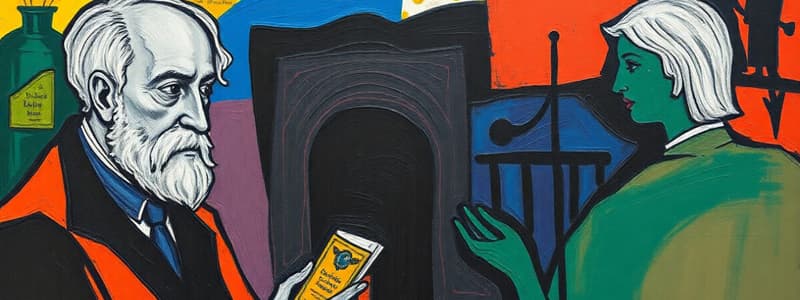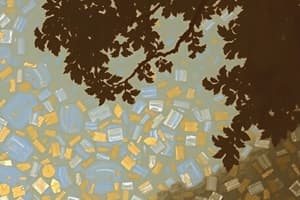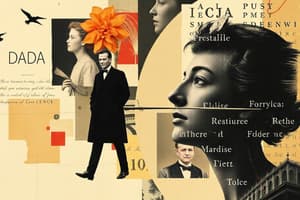Podcast
Questions and Answers
Which literary device involves giving human qualities to non-human entities?
Which literary device involves giving human qualities to non-human entities?
- Simile
- Imagery
- Metaphor
- Personification (correct)
What theme often explores various forms of attachment between characters in literature?
What theme often explores various forms of attachment between characters in literature?
- Identity and Selfhood
- Love and Relationships (correct)
- Politics and Nationalism
- Social Commentary
Which of the following is considered a hallmark of non-fiction literature?
Which of the following is considered a hallmark of non-fiction literature?
- Poetic verse
- Novellas
- Biographies (correct)
- Short stories
How does literature often reflect the ideologies of its time?
How does literature often reflect the ideologies of its time?
What literary device creates vivid descriptions that appeal to the senses?
What literary device creates vivid descriptions that appeal to the senses?
What key characteristic distinguishes the Romantic Period from other literary periods?
What key characteristic distinguishes the Romantic Period from other literary periods?
Which author is primarily associated with the Medieval Period of English literature?
Which author is primarily associated with the Medieval Period of English literature?
Which literary period is characterized by experimentation in style and form?
Which literary period is characterized by experimentation in style and form?
Which of the following authors is known for work during the Victorian Period?
Which of the following authors is known for work during the Victorian Period?
What is a defining feature of the Neoclassical Period?
What is a defining feature of the Neoclassical Period?
Which genre includes both tragedy and comedy in its format?
Which genre includes both tragedy and comedy in its format?
Which author is famously known for works in the Postmodern Period?
Which author is famously known for works in the Postmodern Period?
Which characteristic is NOT typical of the Renaissance Period?
Which characteristic is NOT typical of the Renaissance Period?
Flashcards
Medieval Period
Medieval Period
A literary period in English literature characterized by religious themes, the influence of the Church, and the emergence of vernacular literature.
Renaissance Period
Renaissance Period
A literary period emphasizing humanism, classical ideals, and exploration, marked by a renaissance of art and culture.
Neoclassical Period
Neoclassical Period
A literary period emphasizing reason, order, and classical forms, focusing on satire and formal verse.
Romantic Period
Romantic Period
Signup and view all the flashcards
Victorian Period
Victorian Period
Signup and view all the flashcards
Modernist Period
Modernist Period
Signup and view all the flashcards
Postmodern Period
Postmodern Period
Signup and view all the flashcards
Poetry
Poetry
Signup and view all the flashcards
Metaphor
Metaphor
Signup and view all the flashcards
Fiction
Fiction
Signup and view all the flashcards
Personification
Personification
Signup and view all the flashcards
Simile
Simile
Signup and view all the flashcards
Non-fiction
Non-fiction
Signup and view all the flashcards
Study Notes
Overview of English Literature
- English literature encompasses a vast body of written works produced in the English language, spanning centuries and reflecting diverse cultural, social, and historical contexts.
- It encompasses various genres, including poetry, drama, fiction, and non-fiction.
- Key historical periods and movements within English literature include the Medieval period, Renaissance, Neoclassicism, Romanticism, Victorian era, Modernism, and Postmodernism.
- Each period presents unique characteristics in terms of themes, styles, and writing techniques.
Key Historical Periods
- Medieval Period (roughly 1100-1500): Characterized by religious themes, the influence of the Church, and the emergence of vernacular literature. Examples include Geoffrey Chaucer's Canterbury Tales and various religious works.
- Renaissance Period (roughly 1485-1660): Focused on humanism, classical ideals, and exploration. Key authors include William Shakespeare, Christopher Marlowe, and Edmund Spenser. The period saw the flowering of drama and poetry.
- Neoclassical Period (roughly 1660-1785): Emphasized reason, order, and classical forms. Key authors include Alexander Pope, John Dryden. Famous for satire and formal verse.
- Romantic Period (roughly 1785-1830): Characterized by emotion, individualism, and a focus on nature. Key authors include William Wordsworth, Samuel Taylor Coleridge, Lord Byron, Percy Bysshe Shelley, and John Keats. Strong themes of nature and the sublime.
- Victorian Period (roughly 1837-1901): Marked by rapid social and industrial change, and explorations of morality and social issues. Key authors include Charles Dickens, Jane Austen, Emily Bronte, and Charlotte Bronte.
- Modernist Period (roughly 1901-1945): A reaction against Victorian conventions, featuring experimentation in style and form, and explorations of the human condition in a rapidly changing world. Key authors include Virginia Woolf, James Joyce, T.S. Eliot, and F. Scott Fitzgerald.
- Postmodern Period (roughly 1945-present): Characterized by a rejection of grand narratives and an emphasis on fragmentation, irony, and subjectivity. Key authors include Salman Rushdie, Toni Morrison, and Derek Walcott.
Key Genres
- Poetry: Explores a range of emotions, thoughts, and experiences through verse. Subgenres include lyric, narrative, and epic.
- Drama: Consists of plays designed for performance. Includes tragedy, comedy, and history.
- Fiction: Includes novels, short stories, and novellas that narrate imagined events and characters.
- Non-fiction: Includes essays, biographies, literary criticism, and historical accounts.
Key Themes
- Love and Relationships: A recurring theme throughout English literature, exploring various forms of love, from romantic to familial.
- Social Commentary: Many works of English literature address social issues and injustices of their time.
- Nature: Nature plays a crucial role in the Romantic and other periods, evoking a sense of the sublime or the spiritual in the natural world.
- Identity and Selfhood: The exploration of human identity and the search for self-knowledge is a persistent theme.
- Politics and Nationalism: Literature reflects and shapes political and nationalistic ideologies of its time.
Key Literary Devices
- Metaphor: A comparison of two unlike things.
- Simile: A direct comparison of two unlike things using "like" or "as."
- Personification: Giving human qualities to non-human entities.
- Imagery: Language used to create vivid sensory descriptions.
Studying That Suits You
Use AI to generate personalized quizzes and flashcards to suit your learning preferences.




